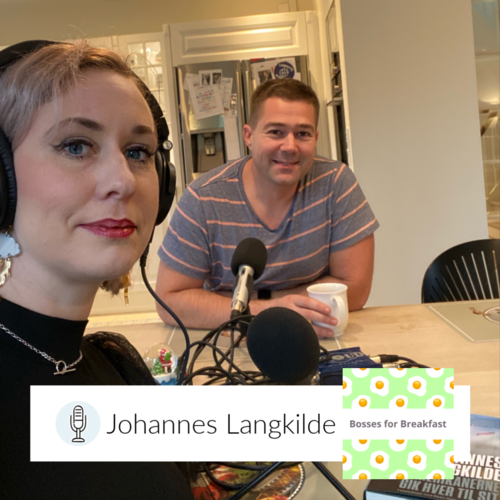What is Modern journalism today?
In a nutshell:
In this episode of Bosses for Breakfast, host Jessie Frahm joins journalist Johannes Langkilde at his home in Denmark for a cup of coffee.
Johannes Langkilde is a Danish news anchor, talk show host, and former US correspondent. Every morning, Johannes wakes up before his wife and kids, turns on his phones, reads two newspapers, and then goes downstairs to have his first cup of coffee. Johannes is an avid coffee drinker, already on his fifth cup as this interview begins.
Johannes’s career began in music school in southern France, where he studied to become a jazz pianist. After a year, he decided to keep music as a hobby, and pursued a bachelor’s degree in media science. Soon after he received his degree, he decided to start all over and went to journalism school in Denmark. At age 26, he became the youngest anchor to anchor the news in Denmark. After anchoring for 9-10 years, he switched to the other of the two major networks in Denmark and moved to Washington, D.C. He spent four years in the United States covering politics, general affairs, and, finally, Trump’s race in the 2016 presidential election. Johannes noticed a distinct difference between journalism in the U.S. and journalism in Denmark. In the U.S., Johannes iterates, networks and media outlets are obviously biased and have a clear agenda. In Denmark, very much like the British tradition, journalists seek truth, report the facts, state the news, and avoid bias. Johannes admits that, of course, no one can be completely unbiased, but he does his best to cover every angle of the story
“ Good journalism is all about telling a story, knowing your audience, and being truthful”
He believes that a journalist has to ask the right questions to give the audience the best possible product; then they can decide the truth for themselves. Johannes’s goal is to be a catalyst for information, either educating or entertaining his audiences. The height of professional journalism is to be able to do both.
Navigating the media
Much of the world’s bad journalism, Johannes says, is rooted in amateurism: the journalists simply aren’t good enough. Some of it is polluted by journalists who intentionally deceive and aim to move the public opinion through what they call objective journalism; this is what we now call “fake news.” Good journalism, however, is all about telling a story, knowing your audience, and being truthful. A good story is a story that helps people learn about other people, themselves, or a mix of both. One of Johannes’s most powerful stories was about the homeless and inmates of a California prison. Johannes himself lived in the prison as an inmate to gain the proper perspective. He was able to report much more profoundly than if he had written the piece standing on the other side of the bars.
Journalism is in a crisis because the media has lost the confidence of their audience. Fake news and biased writers have planted seeds of distrust in the population. Johannes believes that the only way to regain this trust is to be transparent, be truthful, be better, and make a difference. He hopes that the old media can become, once again, the staple of knowledge in a big sea of information. His dream is to have viewers come home from a long day of informational influx, turn on the TV, and watch his news show as the place they trust for their information. A fierce advocate of impartial reporting, Johannes strives to be a journalist who does the right thing and always tells the truth.
Links
- Find Johannes’s book Da amerikanerne gik hver til sit on Goodreads
- Follow Johannes on Twitter @johslangkilde
- Follow Johannes on Instagram @johslangkilde
- Like Johannes on Facebook

